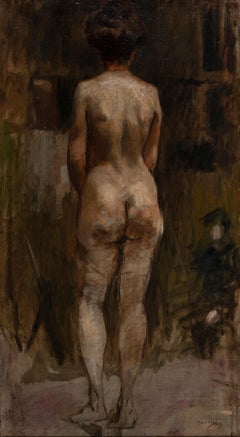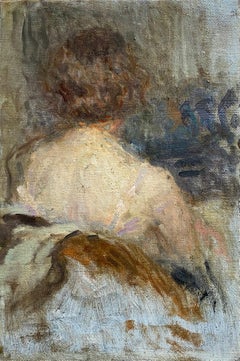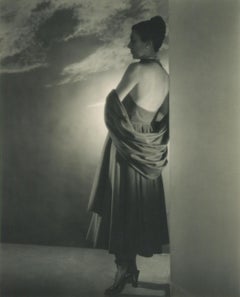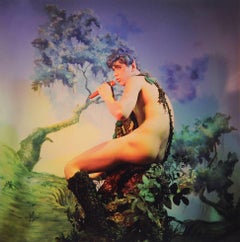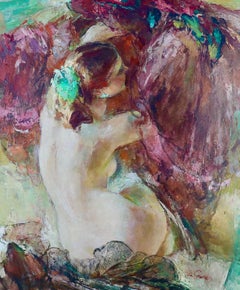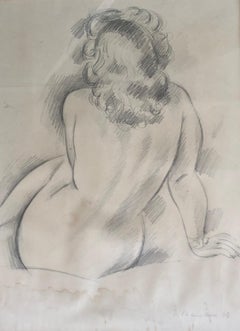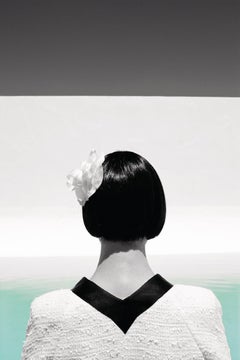From Behind
Early 20th Century Post-Impressionist Nude Paintings
Canvas, Oil
1950s Modern Figurative Drawings and Watercolors
Paper, Pencil
1920s Post-Impressionist Portrait Paintings
Canvas, Oil, Cardboard
1940s Photography
Silver Gelatin
1990s Black and White Photography
Silver Gelatin
1960s Other Art Style Portrait Photography
C Print
1940s Nude Paintings
Canvas, Oil
1940s Nude Drawings and Watercolors
Crayon
2010s Figurative Photography
Photographic Paper
20th Century Modern Figurative Prints
Pencil
Late 20th Century Modern Nude Drawings and Watercolors
Ink
Late 20th Century Nude Drawings and Watercolors
Watercolor
20th Century Figurative Drawings and Watercolors
Crayon
Early 20th Century American Impressionist Figurative Paintings
Canvas, Oil
Mid-20th Century Modern Nude Paintings
Oil
Early 2000s American Impressionist Nude Drawings and Watercolors
Paper, Charcoal
2010s Abstract Expressionist Paintings
Oil
2010s Expressionist Drawings and Watercolor Paintings
Pencil
1970s Modern Figurative Drawings and Watercolors
Pencil
1950s American Modern Nude Drawings and Watercolors
Ink
1970s Contemporary Portrait Drawings and Watercolors
Ink, Watercolor
1990s Nude Drawings and Watercolors
Pastel, Pencil, Paper
20th Century Modern Nude Paintings
Oil
Early 1900s French School Nude Drawings and Watercolors
Paper
1920s Modern Figurative Drawings and Watercolors
Pencil
1970s Contemporary Figurative Paintings
Paper, Ink, Gouache
Mid-19th Century Modern Figurative Drawings and Watercolors
Paper, Pencil
Late 19th Century Modern Figurative Drawings and Watercolors
Ink, Paper
2010s Abstract Expressionist Abstract Paintings
Oil Pastel
20th Century Nude Paintings
Oil
20th Century Surrealist Figurative Drawings and Watercolors
Gouache, Board
1950s Abstract Expressionist Nude Paintings
Oil, Illustration Board
21st Century and Contemporary Contemporary Portrait Photography
21st Century and Contemporary Black and White Photography
Silver Gelatin
2010s Contemporary Figurative Paintings
Mixed Media
1920s Nude Drawings and Watercolors
Charcoal
20th Century Impressionist Portrait Drawings and Watercolors
Pencil
21st Century and Contemporary Contemporary Color Photography
Archival Pigment
1990s Contemporary Nude Photography
Silver Gelatin
Early 2000s Photography
Archival Pigment
2010s Contemporary Nude Photography
Archival Pigment
Vintage 1930s American Art Deco Paintings
Paint
2010s Contemporary Color Photography
Archival Paper, C Print
2010s Figurative Drawings and Watercolors
Paper, Watercolor
Late 20th Century Impressionist Figurative Paintings
Oil
Mid-20th Century Contemporary Figurative Prints
Etching
17th Century Old Masters Figurative Prints
Laid Paper, Etching
2010s Contemporary Nude Photography
Archival Pigment
20th Century Post-Impressionist Figurative Drawings and Watercolors
Pencil
2010s Contemporary Nude Photography
Archival Pigment
Mid-20th Century German Mid-Century Modern Barware
Porcelain, Cork
2010s Other Art Style Figurative Sculptures
Porcelain, Dye Transfer
2010s Other Art Style Figurative Sculptures
Porcelain, Dye Transfer
2010s Other Art Style Figurative Sculptures
Porcelain, Dye Transfer
2010s Other Art Style Figurative Sculptures
Porcelain, Dye Transfer
2010s Other Art Style Figurative Sculptures
Porcelain, Dye Transfer
2010s Other Art Style Figurative Sculptures
Porcelain, Dye Transfer
20th Century Modern Black and White Photography
Black and White, Photographic Paper
Late 19th Century Modern Figurative Drawings and Watercolors
Paper
1950s Figurative Paintings
Tempera, Board
- 1
- ...
- 1stDibs ExpertMarch 25, 2024The meaning of a mandala relates to Buddhist and Hindu religious beliefs. According to these traditions, the mandala represents the universe and symbolizes how suffering can be a pathway to joy. The act of creating a mandala is meant to remind the artist of the fleetingness of material possessions as well. On 1stDibs, explore a large selection of fine art.
- What is the story behind KAWS?1 Answer1stDibs ExpertApril 5, 2022KAWS is an American artist, toy and clothing designer. Born in New Jersey under the name Brian Donnelly, he became interested in graffiti very early on. He earned a BFA and began working for Disney. His artwork gained popularity and he began traveling and designing toys and clothing while continuing art and sculptures. On 1stDibs, find a variety of original artwork from top artists.
- Who is the artist behind KAWS?1 Answer1stDibs ExpertMarch 25, 2024The artist behind KAWS is Brian Donnelly. As a kid in Jersey City, New Jersey, he got into graffiti art, using KAWS as his tag. Today, KAWS creates a diverse range of art and design objects. There are KAWS figures and toys, sculptures, colorful drawings, paintings and prints that appropriate pop phenomena like the Smurfs, the Simpsons and SpongeBob SquarePants. On 1stDibs, shop a range of KAWS art.
- 1stDibs ExpertApril 5, 2022Gabriela Hurst is the designer for the French luxury fashion house Chloé. She became the label's Creative Director in 2020. Previous designers for the label include Natacha Ramsay-Levi, Clare Waight Keller, Hannah MacGibbon and Karl Lagerfeld. On 1stDibs, shop a collection of Chloé apparel and accessories.
- 1stDibs ExpertSeptember 25, 2019
The main idea behind Surrealism is to enable subconscious creativity.
- 1stDibs ExpertMay 30, 2024The story behind Louis Vuitton is one of craft and innovation in the worlds of fashion, jewelry and furniture. The company's modest origins can be traced back to when its founder, Louis Vuitton, left his provincial French city of Anchay in the early 1830s to make a new life in Paris. When he arrived, he toiled as a box maker and packer for more than a decade and built relationships with royals and members of the upper class while working for the empress of France, Eugénie de Montijo. In 1854, Vuitton launched his namesake company with a humble workshop on rue Neuve des Capucines and advertised his services with a small poster that read: "Securely packs the most fragile objects. Specializing in packing fashions." Long before his brand would become known globally for its exemplary top-handle bags and stylish totes, Vuitton produced stackable and rectangular trunks. The most common trunks of the era were round, which weren't ideal for toting and storing. In 1858, Vuitton debuted his lightweight, handcrafted canvas trunks, which were sturdy, rugged and equipped with convenient compartments. Travel's popularity broadened in the late 19th century, and Vuitton's trunks could easily be packed into train cars and ships; upright trunks offered hanging wardrobe storage that would allow his clients to transport their sophisticated garments without worry. Demand increased, and the company grew. When Louis Vuitton died in 1892, control of the luxury house was passed onto his only son, Georges Vuitton. In 1914, a Louis Vuitton store opened at 70 Champs-Élysées. The largest travel-goods store in the world at the time, it became the company's flagship. Today, the fashion house remains one of the most iconic producers of leather goods in the world. Find a diverse assortment of Louis Vuitton bags on 1stDibs.
- 1stDibs ExpertApril 5, 2022What you put behind a curved couch is largely a matter of personal preference. Place a table lamp behind one to provide task lighting or position a large sculpture or tall potted plant behind it to add interest to your space. Shop a collection of antique and vintage curved couches on 1stDibs.
- 1stDibs ExpertDecember 17, 2024The story behind Hamilton watches goes back to the late 19th century. As railroad tracks were laid across the United States and steam locomotives began traversing vast distances, the American railroad system ran into a problem. Time was not standardized across the country.
Therefore, in 1883, the railroad companies established the four time zones as we know them today. However, train conductors were not always synchronized, leading to deadly railroad accidents. Enter watchmaker Hamilton, founded in 1892. Railway workers would be required to wear a pocket watch to keep on schedule, and the watchmaking industry — especially pocket-watch manufacturers such as Hamilton — benefitted. The company’s timepieces eventually earned the moniker “The Watch of Railroad Accuracy.”
Hamilton transitioned from pocket watches to wristwatches in 1914, as it supplied timepieces to American troops fighting in World War I. The new style of watch also appealed to aviators, and Hamilton aeronautical watches became all the rage among pilots, particularly those flying for the new U.S. Airmail service.
The general public’s interest in Hamilton watches grew rapidly in the 1920s. Legendary polar explorer Admiral Richard E. Byrd timed his historic flights over glaciers and chunks of sea ice with a Hamilton pocket watch in the late 1920s. Hamilton’s Piping Rock watch, an Art Deco-inspired design featuring elegant Roman numerals set in black for the hour markers, debuted in 1928 and was gifted to the New York Yankees to celebrate their World Series win that year. The model was also featured in the film Shanghai Express alongside the brand’s Flintridge watch, further expanding Hamilton’s popularity. (Hamilton watches can also be seen in the films The Frogmen, Blue Hawaii, 2001: A Space Odyssey and Men in Black.) In the second half of the 20th century, Hamilton became well known for several innovations: It developed the first-ever battery-operated electric watch, the Ventura, in 1957, as well as the first-ever digital wristwatch, the Hamilton Pulsar Time Computer, in 1970. Three years later, superspy James Bond donned a Pulsar in Live and Let Die.
Today, the company is part of the Swatch Group, and its headquarters and production facilities relocated from Pennsylvania to Switzerland in 2003.
On 1stDibs, find a wide range of Hamilton watches. - 1stDibs ExpertFebruary 21, 2024The story behind Balenciaga begins with Cristóbal Balenciaga.
As a child in the quiet fishing village of Getaria in Spain's Basque region, he worked alongside his seamstress mother. Showing immense talent, he earned commissions as a teenager from local patron Marquesa de Casa Torres, who paid for his tailoring education in Madrid.
In 1917, Balenciaga established his first fashion house, named Eisa, for his mother, in the trendy resort town of San Sebastián. He soon followed it with boutiques in Madrid and Barcelona, drawing such clientele as the Spanish royal family. When the Spanish Civil War put a hold on his prospects in Spain, the designer moved to Paris, opening a house on Avenue Georges V in 1937.
Balenciaga continued designing until 1968, when he retired after three decades of influential work and his fashion house went dormant. The rights to Balenciaga were acquired by Jacques Bogart SA in 1986. Under designer Michel Goma, who focused on ready-to-wear, the brand experienced a resurgence, with his first collection introduced in 1987.
Find a large selection of Balenciaga apparel and accessories on 1stDibs. - 1stDibs ExpertApril 5, 2022The story behind the Japanese cat traces back to ancient folklore. In the tale, a cat saves the life of a samurai who turns out to be quite wealthy. To show his thanks, the man made a very generous donation to the temple. In Japanese culture, cat sculptures and figurines are symbols of good luck and known as “maneki-neko.” Find a range of Japanese decorative objects on 1stDibs.
- 1stDibs ExpertApril 5, 2022A sofa table is a long and narrow table that’s designed to sit behind a couch. They are also called console tables and hall tables because their thin nature makes them great accent pieces in these places as well. Shop a collection of furniture from some of the world’s top sellers on 1stDibs.
- 1stDibs ExpertApril 5, 2022The Claddagh ring has been around for centuries with a long and rich history of friendship, loyalty and love. The classic design features two hands supporting a heart topped with a crown that signifies strong friendships. You’ll find a variety of Claddagh rings on 1stDibs.
- 1stDibs ExpertJanuary 10, 2025The meaning behind the Portrait of Dora Maar is subject to personal interpretation. However, many art historians believe the abstracted portrait represents the turmoil and emotional suffering people endured during the Spanish Civil War. Pablo Picasso witnessed the horrors of the war firsthand, and the experience likely influenced his work. On 1stDibs, shop a collection of Pablo Picasso art.
- 1stDibs ExpertOctober 15, 2024The real story behind Big Eyes is the life of artist Margaret Keane. She was born Peggy Doris Hawkins on September 15, 1927, in Nashville, Tennessee. When she was two years old, her eardrum was permanently damaged during a mastoid operation. Keane learned to watch the eyes of the person talking to her to understand them, influencing the drawings he began creating as a child. At age 10, she took classes at the Watkins Institute in Nashville. At age 18, she attended the Traphagen School of Design in New York City for a year. She initially earned money by painting clothing and baby cribs in the 1950s until she began painting portraits. Early on, Keane experimented with kitsch. She began painting her signature "Keane eyes" when she started to create portraits of children. Keane's works are now in collections all over the world, including the Museum of Contemporary Art in Madrid, the National Museum of Western Art in Tokyo and the Memphis Brooks Museum in Memphis, Tennessee. On 1stDibs, shop a diverse assortment of Margaret Keane art.
- 1stDibs ExpertAugust 15, 2024The piece of furniture behind a desk is usually called a credenza. It typically features cabinets and drawers for storing and organizing paperwork and office supplies. The word credenza originates from Italian and means trust or belief. During the 16th century, Italian rulers and high-ranking clergy often had tasters perform a credenza, sampling food or drink to ensure that it wasn't poisoned. Historians believe that the room where this testing took place became called "the credenza," and that eventually the term got applied to cabinets where tasting supplies were kept within the room, leading to its association with the modern office cabinet. Explore a diverse assortment of credenzas on 1stDibs.
- 1stDibs ExpertJanuary 10, 2025The meaning behind Aya Takano's art is open to interpretation. Soon after obtaining her art bachelor's degree, Takano became an assistant of Takashi Murakami and joined Kaikai Kiki, the artistic community and production studio created in 2001 by Murakami for like-minded artists working in the Superflat style. The Superflat movement, popularized by Murakami, emphasizes the two-dimensionality of figures influenced by Japanese manga and anime while simultaneously exposing the fetishes of Japanese consumerism, including the infantilization and objectification of women. With this reference in mind — as well as inspiration ranging from erotic Edo prints and Gustav Klimt to Claude Monet and the manga of Osamu Tezuka — Takano creates her own mythology from a feminine perspective. On 1stDibs, shop a variety of Aya Takano art.
- 1stDibs ExpertJanuary 10, 2025The meaning behind Comme des Garçons relates to the signature style the brand's founder, Rei Kawakubo, is known for. In French, the brand's name means "like the boys." It relates to Kawakubo's androgynous styles with asymmetrical, twisted silhouettes that envelope the body. While she once told the New York Times that the “basics of clothing lie in men’s fashion,” Kawakubo believes in the concept of humanness in clothes (she titled her spring 1995 show “Transcending Gender”). On 1stDibs, shop a selection of Comme des Garçons apparel and accessories.
